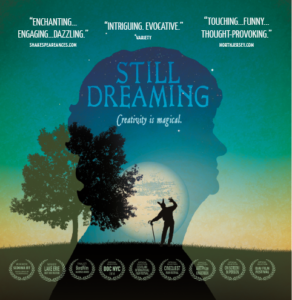Happy Shakespeare Death Day!
 So, today is the 400th anniversary of William Shakespeare’s death, and we’re celebrating (is it weird to be celebrating a death?) by promoting the DVD, Video On Demand, and educational kit release of Philomath Films’ Still Dreaming.
So, today is the 400th anniversary of William Shakespeare’s death, and we’re celebrating (is it weird to be celebrating a death?) by promoting the DVD, Video On Demand, and educational kit release of Philomath Films’ Still Dreaming.
Let’s start with full disclosure
Francis is the Outreach Producer for the film, and Good Grief Shakespeare is an affiliate, which means we get a portion whenever someone buys it through our affiliate link. But we are not getting paid for our opinions. In fact, we got involved because we saw the movie, loved it, and offered to help spread the word. (By the way, you can also buy the DVD or stream it through Amazon.)
On with the show!
You might know Philomath Films as the ones who gave us the documentary Shakespeare Behind Bars. Like its predecessor, Still Dreaming documents the process of producing one of Shakespeare’s plays in a non-traditional location with a non-traditional cast. Also like its predecessor, it shows how any lines between art and life are blurry at best.
This time around, the cast members are from the Lillian Booth Actors Home. They come from a variety of theatre-related backgrounds, but it’s their present lives, not their past careers, that enlighten their work. As Ronnie Scheib describes in Variety,
The play is “A Midsummer Night’s Dream,” and before long the world of the nursing home and Shakespeare’s enchanted forest begin to mirror each other in disquieting ways, as mental and physical disabilities, rather than fairy spells, shift time and sow confusion.
Yes, of all of Shakespeare’s shows to chose for a retirement community, they went with Midsummer, a play full of young lovers running around in the woods. This cast doesn’t need youth, though, to create a Midsummer unlike any you’ve seen before. They bring talent and professional experience, including some considerable Broadway credits, as well as life experience that cannot be duplicated by younger actors.
I’ll absolutely play favorites now to illustrate: Charlotte Fairchild is magical. I don’t just mean her outside-the-box performance as Puck, which would delight any audience in any production on any stage, but also how her Alzheimer’s disease seems to melt away whenever she gets a chance to perform, be it on stage or in her own room. Her story connects personally, too. As far back as I can remember, my grandmother had Alzheimer’s. Seeing Charlotte sparkle through hers reminds me of those few, brief, lucid moments when my grandmother became herself again. Sadly, Charlotte passed away not long after filming wrapped. Thankfully, she and her magic are now immortalized on film.
The healing arts
I think that’s the real power of Still Dreaming—it shows us how art heals. In the able, supportive hands of directors Noah Brody and Ben Steinfeld of Fiasco Theater, even the most experienced performers grow. And Lynette Loose, perhaps the youngest, least experienced of the bunch (and whose own life reflects Hermia’s plight in you-can’t-make-this-up ways) discovers an inner strength she probably never believed existed.
This Midsummer production doesn’t just help heal the emotions. Many of those involved clearly show increased energy and engagement. Perhaps the most amazing revelation in the film, however, comes after the final performance, when we find out some residents of the home have been able to cut back on their medications. The film doesn’t linger on this moment, it’s almost a throwaway, but it stands as a testament as quantitative evidence of what we’ve witnessed throughout the previous hour and a half.
Tempting you with a taste
One last personal note: anyone who has ever participated in a theatrical production, or worked on a team of any sort, will recognize the universal dynamics of the process. Truths come out, egos clash, tears are shed…it’s yet another level of connection between the film and viewer.
It may sound cliché, but I can honestly say every time I watch Still Dreaming, I get something new out of the experience. Check out the trailer below to whet your appetite:
